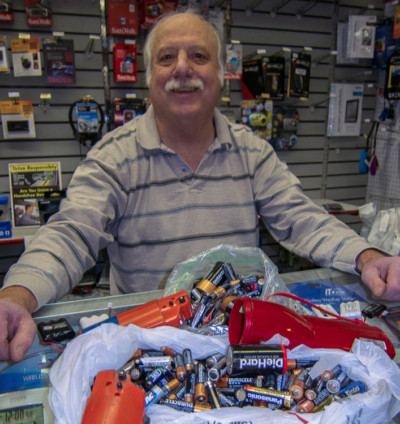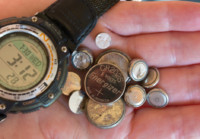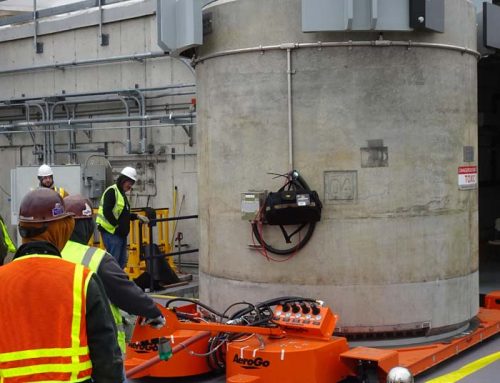If you’ve ever tried to include dead alkaline (or other) batteries in your curbside recycling bin, and had them left behind by the collection crew, you probably share a common frustration.
You think: These things include chemicals, and metals, and they can’t be good for the environment. What can I do with them?
Options have grown. Several businesses in the Gorge are running their own battery recycling efforts. Radio Shack on Hood River’s Heights, is helping provide drop-off options for residents. About a year ago, store owner Dave Henne started accepting drop-offs from customers. He’s got about five months worth of batteries awaiting transfer to the next hazardous waste collection date.

Dave Henne displays some of the batteries that people have dropped off over the last 5 months at Radio Shack on the Heights in Hood River.
You and I could collect and deliver our own waste batteries, if we chose to (or could remember). But because there are only four hazardous waste collection dates per year, the year-round drop-off option at a place such as Radio Shack provides a lot of convenience for people with small volumes of batteries, according to David Skakel, program coordinator for the Tri-County Hazardous Waste & Recycling Program.
Next collection time. He says either he or Susan Hess (Envirogorge.com editor) will pick up the batteries from Radio Shack and drop them off at the transfer station on hazardous waste days. The next collection date is from 9 a.m. to 2 p.m. Aug. 15, 2014 in Hood River, and the same hours Aug. 16, 2014 in The Dalles.
What goes where. Skakel says lead-acid batteries (the type typically found in cars, or uninterruptible power sources for computers) can be taken to the transfer station any day of the week.
“Anything that says PB on it stands for lead-acid,” he says. Other rechargeable batteries such as nickel cadmium and lithium need to go through the hazardous waste collection.
Why the change in battery recycling. Skakel says manufacturing changes have reduced concerns about toxicity. “The key issue now is with resource shortages. Global companies are starting to sober up to this from a profitability motive. They’re running out of feedstock and materials for manufacturing.”
In short, it’s cheaper and easier to tap a recycled resource for rare earth metals than to seek and extract them from natural sources. Because those metals are critical to defense and electronics applications, they also become a matter of national security. Recycled sources minimize pressures to militarily pursue natural resources.
Skakel applauds domestic battery manufacturers for taking the lead on recycling for the last 20 years. They even sought legislation in Oregon that would have mandated recycling—an effort to bring off-shore battery makers into the recycling fold—but push-back from the computer industry squashed that initiative.
Henne says Radio Shack used to have a national program of recycling batteries, but the requirements for packaging and shipping made it onerous on retailers, so he stopped taking part. The local program has been a nice alternative.
Skakel says alkaline batteries—the type we install in flashlights, smoke detectors and portable radios —don’t have much resource for recycling. He says Tri-County now collects them and sends them off for use as fuel in steel smelting.
Small battery market. Chris Strader and his wife, Julie, owners of Hood River Jewelers, have collected watch batteries for years. When he has four or five pounds, he ships them off to a refinery in Georgia, and they send him a check for the value of the reclaimed metals. “The money is in the silver. There’s a small amount of silver in the batteries. But it’s mostly stainless steel.”
Still, little bits add up. And, after all, it’s the thought that counts.












